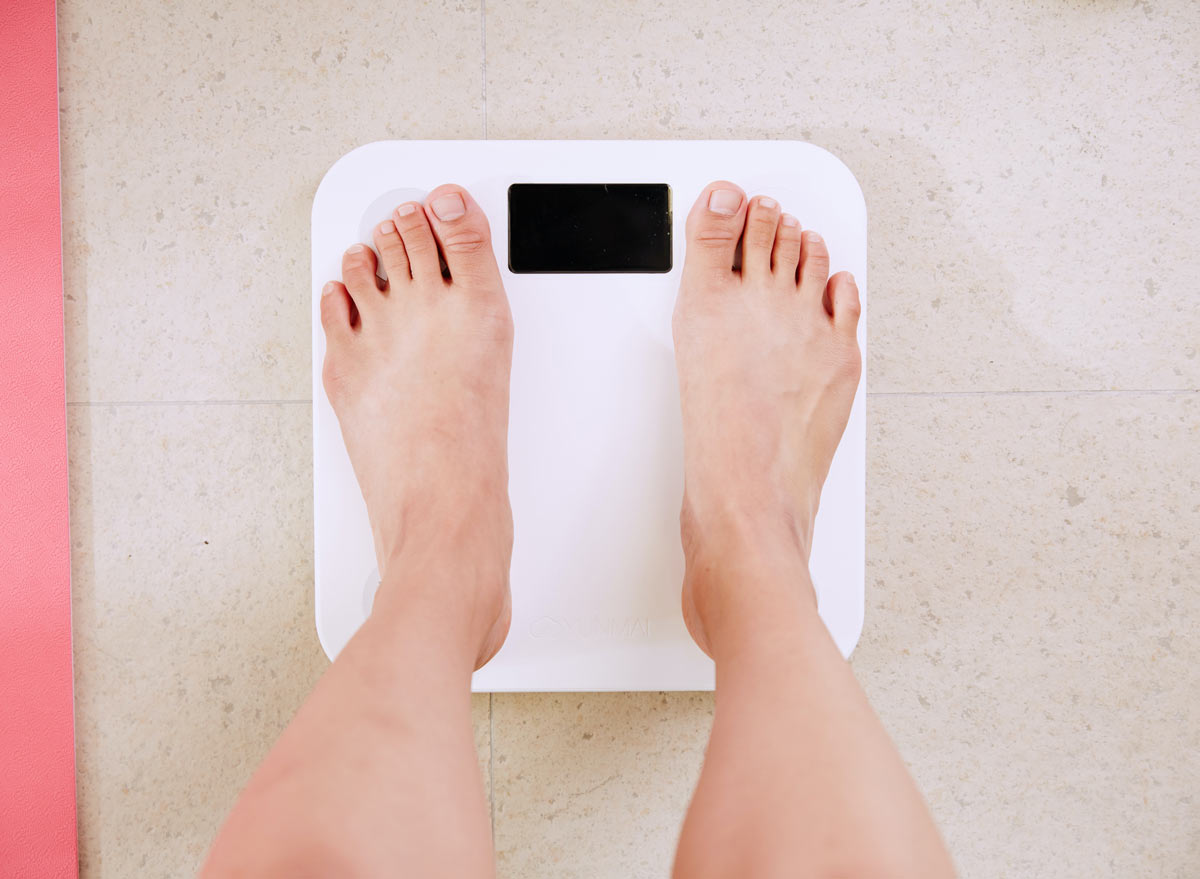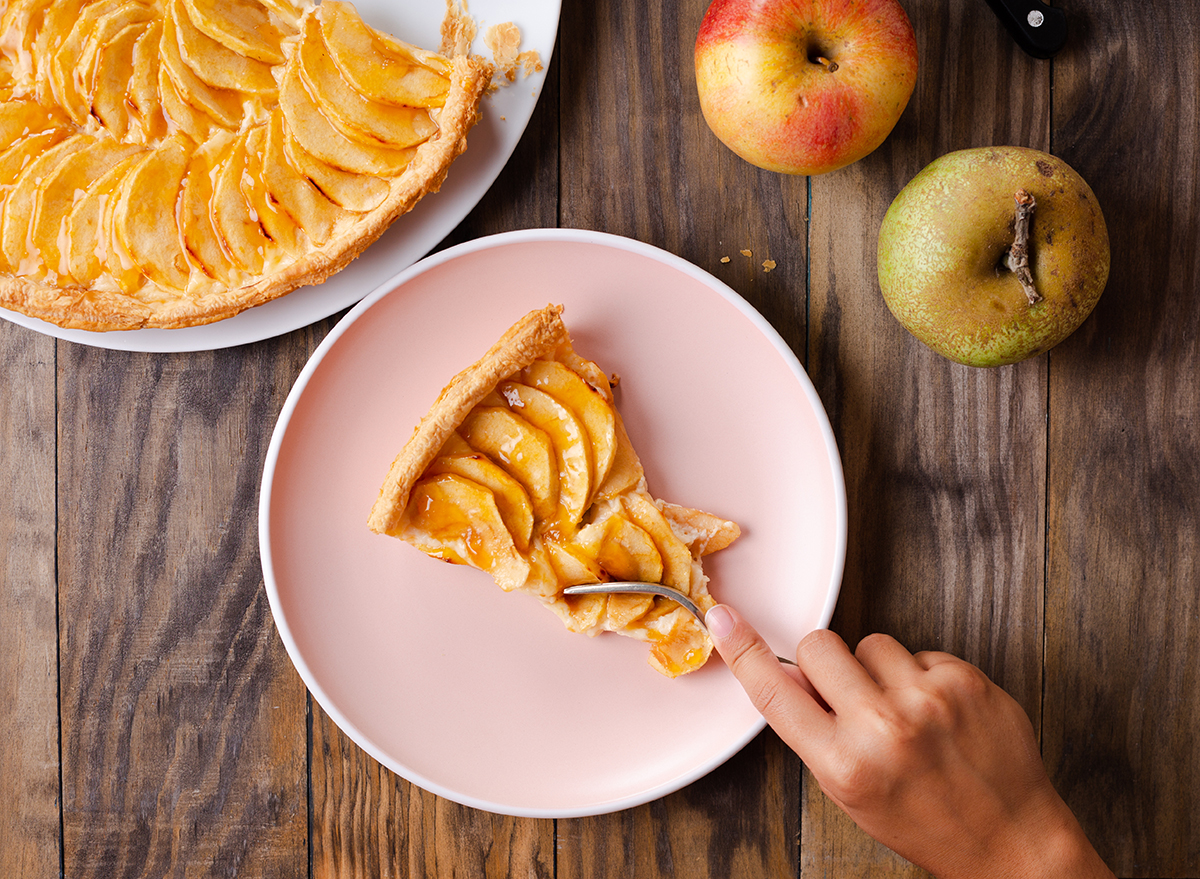What Happens to Your Body When You Eat Dessert

We've all heard it before: Sugar isn't that great for you. Having a lot of added sugars in your diet can wreak havoc on your body if you're not careful. However, does that mean we can't indulge in a sweet treat once in a blue moon? Is it really bad for your body when you eat dessert?
In order to settle this hot topic, we consulted four different registered dietitians on the matter. Surprisingly, their opinions on the matter were unanimous: Dessert is fine—in moderation. Here's what they had to say, and how eating dessert often will affect your body if you're not careful.
You may stay on track with your weight loss goals.

While it may seem counter-intuitive, having a dessert on the regular can actually help you stay on track with your overall weight loss goals. The key is to portion out your dessert, and have it fit in with your set weight loss goals. It's also important to be eating a diet mostly filled with good nutrients.
"I think if you're making sure [your] diet is varied and that you're not binging sleeves of Oreo cookies, then you're likely okay," says Vanessa Rissetto MS, RD, CDN and co-founder of Culina Health. "If you're ingesting 600 calories of chocolate every night, then we might first need to work on behavioral modifications and maybe only having a dessert 1-2 [times] per week."
Risetto recommends adding in at least three cups of vegetables, 25-30 grams of fiber, one serving of fruit, and a good amount of water. This will satiate your body and help prevent you from overeating your dessert.
"How you fit dessert into your life, be it a little each day or one big dessert a week, is really about preference," says Amy Goodson, MS, RD, CSSD, LD. "The key is making sure you include it in a nutrient-rich diet and allow for it in total caloric intake."
"Portion and ingredients matter," says Toby Smithson, MS, RDN, LD, CDCES, FAND, Diabetes Lifestyle Expert, author of Diabetes Meal Planning and Nutrition for Dummies and founder of DiabetesEveryDay.com. "Moderation is key which can be done by balancing your food intake to fit in a favorite dessert. It's important to look at the science when making recommendations. In this case, consider the dietary guidelines as our foundation. The 2020 Dietary Guidelines Advisory Committee recommends that only 6% of energy intake come from added sugars in our eating plan. Most desserts will fall into the added sugar category."
You'll gain weight if you don't portion it out.

Without portioning out your dessert, you can easily overeat based on the allotted calories that your body can handle.
"Dessert foods often pack in a lot of calories per a small volume," Rachel Paul, PhD, RD from CollegeNutritionist.com. "For example, 1 cup of regular ice cream is about 350 calories. If a person is maintaining their weight at 1700 calories, one extra bowl of ice cream, especially over time, can easily lead to weight gain."
"It is important to note that if you eat more calories than what you need, in dessert or any food, that can result in weight gain," says Goodson.
Curious about how many calories you should have for your body? Here's how to calculate it.
You'll experience high blood sugar levels if you're not careful.

Spikes in blood sugar are a result of high levels of glucose in the bloodstream. Because glucose is a sugar commonly found in desserts, having too much of it can easily cause spikes in blood sugar levels.
However, it is not ultimately bad to have glucose. According to Healthline, glucose is "the primary fuel that makes your muscles, organs, and brain work properly." This happens when glucose enters your cells, which is what insulin does in your body. This is why diabetics struggle with blood sugar spikes, because the body either doesn't produce much insulin (Type 1) or your body simply can't process blood sugar properly (Type 2).
"Eating more sweets will not cause diabetes, but, if you are already having insulin resistance or diagnosed with pre or type 2 diabetes, sweet desserts can play havoc with your blood sugar readings," says Smithson. "Also, if you have metabolic syndrome or elevated triglycerides, sweet desserts will affect your health outcomes."
This is why it's important to have it in moderation. Goodson recommends the 80/20 Rule when it comes to enjoying dessert. "I always encourage people to live by the 80/20 Rule, meaning that 80% of the time you focus on eating nutrient-rich foods like fruits, vegetables, complex carbohydrates, lean protein and healthy fats, and then 20% of the time you can enjoy foods that are lower in nutrients and higher in added sugars and saturated fats, aka where dessert falls."
You'll become moody if you eat too much of it.

Sugar can actually play a significant role in a person's everyday mood. One study published by Cambridge University Press states that high consumption of processed foods will increase a person's odds of experiencing depression. Sugar is also linked to inflammation, which along with increased levels of depression, can cause loss of appetite, changes in sleep patterns, and heightened perceptions of pain. If consumers are not careful about portioning out the amount of added sugars and processed carbs they consume, they will likely experience changes in mood and issues caused by inflammation.
How to include dessert in your diet

Clearly having a portioned out dessert will not wreak havoc on your body, according to research and the recommendations from these registered dietitians. If you decide you do want to include dessert every day, Paul says it clearly: Count the calories.
"A good idea is to track what you're eating for a few days and see which foods—including dessert—are worthwhile to you from nutrition, satisfaction, and taste standpoints," says Paul. "No food is 'good' or 'bad'—different foods are just more worth it to different people. Tracking one's calories does not need to be a lifelong habit, but it can be eye-opening and helpful in the short term."
"Your body processes food, it's what it's meant to do, and as aforementioned, a small daily dessert isn't going to wreak havoc on it or derail any weight loss efforts—it's overdoing it that will," says Rissetto.
For even more healthy eating tips, be sure to sign up for our newsletter.








